When a hurricane exposes Soleida’s family’s secret sculpture garden, the Cuban government arrests her artist parents, forcing her to escape alone to Central America where she meets Dariel, a Cuban American boy, and together they work to protect the environment and bring attention to the imprisoned artists in Cuba.
Cuba
The Bluest Sky
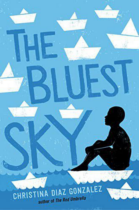
A boy and his family must decide whether to remain in Cuba under a repressive government or risk everything for the chance of a new beginning.
Rima’s Rebellion: Courage In A Time Of Tyranny
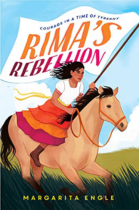
In 1920s Cuba, Rima is bullied and shunned for her illegitimacy, but finds solace in riding her horse and forges unexpected friendships with others who share her dreams of freedom and suffrage. Includes historical note.
Isla To Island
Marisol loves her colorful island home. Cuba is vibrant with flowers and food and people…but things are changing. The home Marisol loves is no longer safe, and then it’s no longer her home at all. Her parents are sending her to the United States. Alone.
Nothing about Marisol’s new life in cold, gray Brooklyn feels like home, not the language, school, or even her foster parents. But Marisol starts to realize that home isn’t always a place. And finding her way can be as simple as staying true to herself.
Featured in WOW Review Volume XIV, Issue 4.
Cuba In My Pocket
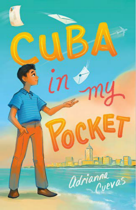
When the failed Bay of Pigs invasion in 1961 solidifies Castro’s power in Cuba, twelve-year-old Cumba’s family makes the difficult decision to send him to Florida alone. Faced with the prospect of living in another country by himself, Cumba tries to remember the sound of his father’s clarinet, the smell of his mother’s lavender perfume.
Life in the United States presents a whole new set of challenges. Lost in a sea of English speakers, Cumba has to navigate a new city, a new school, and new freedom all on his own. With each day, Cumba feels more confident in his new surroundings, but he continues to wonder: Will his family ever be whole again? Or will they remain just out of reach, ninety miles across the sea?
A Song Of Frutas
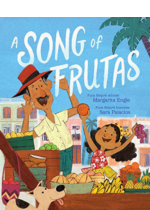
While visiting her abuelo in Cuba, a young girl helps him sell frutas, singing the name of each fruit as they walk, and after she returns to the United States, they exchange letters made of abrazos–hugs. Includes historical and cultural notes.
Un Pregón De Frutas (Song Of Frutas) (Spanish Edition)
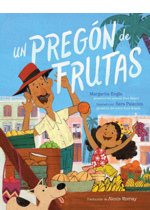
While visiting her abuelo in Cuba, a young girl helps him sell frutas, singing the name of each fruit as they walk, and after she returns to the United States, they exchange letters made of abrazos–hugs. Includes historical and cultural notes.
Your Heart, My Sky:love in a time of hunger
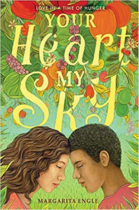
In Cuba’s “special period in times of peace” of 1991, Liana and Amado find love after their severe hunger gives both courage to risk government retribution by skipping a summer of labor to seek food. Told in their two voices plus that of the stray dog that brought them together.
This book is a WOW Recommends book of the month for December 2021.
Your Heart, My Sky is featured in A Dozen Poetry Books.
Letters From Cuba
The situation is getting dire for Jews in Poland on the eve of World War II. Esther’s father has fled to Cuba, and she is the first one to join him. It’s heartbreaking to be separated from her beloved sister, so Esther promises to write down everything that happens until they’re reunited. And she does, recording both the good–the kindness of the Cuban people and her discovery of a valuable hidden talent–and the bad: the fact that Nazism has found a foothold even in Cuba. Esther’s evocative letters are full of her appreciation for life and reveal a resourceful, determined girl with a rare ability to bring people together, all the while striving to get the rest of their family out of Poland before it’s too late.
Alicia Alonso
A biography of Cuban ballerina Alicia Alonso. Alicia Alonso’s artistic achievements are remarkable, considering that she became partially blind and lost her peripheral vision at age nineteen. From childhood, she exhibited a passion for dancing, studying first in Cuba and later in New York City, where she became an overnight sensation in Giselle and was promoted to principal dancer in Ballet Theater. Returning to Cuba in 1948, she founded her own company, which eventually folded due to lack of funding. In 1959 the Cuban government gave her enough money to establish a new dance school, Ballet Nacional de Cuba, which Alonso directs to this day. In elegant free verse and stunning artwork rendered in watercolor, colored pencils, and lithograph pencils on watercolor paper, Carmen T. Bernier-Grand and Raúl Colón capture the seminal events in Alonso’s life. The back matter includes a biography, Alonso’s ballets, choreography, and awards, a glossary, sources, notes, and websites
